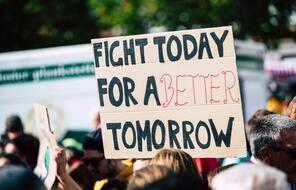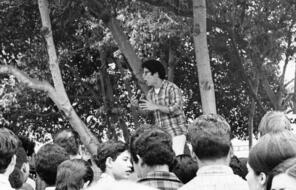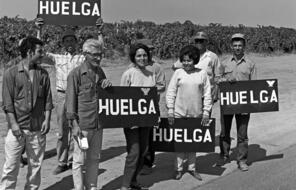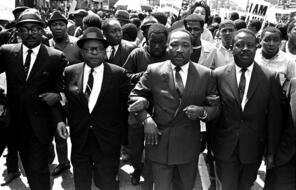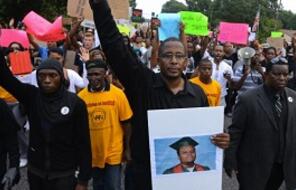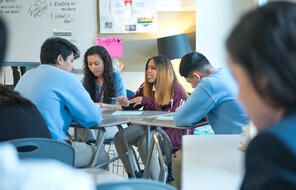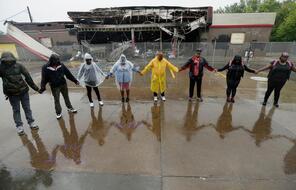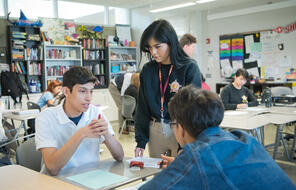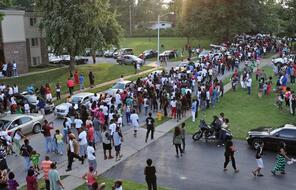Overcoming the Past and Becoming a Single Nation
At a Glance
Language
English — USSubject
- History
- Social Studies
- Democracy & Civic Engagement
South Africa’s transition to democracy was negotiated by political leaders. It is also negotiated, in a far less visible fashion, daily in discussions by ordinary people going about their daily lives and actions over equity and integration, justice and human rights. South African journalist and poet writer Antjie Krog captures some of those subtleties in her 2003 book, A Change of Tongue.
The gunshot cracks. They lean into the curve. Out from among the white boys shifts the figure of a black child, upright, his fingertips effortlessly upwards at every stride. Down the straight he is way ahead, running with the compelling grace of a top athlete. The pavilion crowd is on its feet. The black schools yelling wildly and pressing up against the railings in front. The white parents cheering, one tossing a hat into the air…
'Why is everybody happy?' I ask a man in the tracksuit next to me [a white farmer].
‘The blacks are happy because it is a black kid beating the whites. The whites are happy because the winning black kid is from a white school and was trained by them.’
It is the Kroonstad district athletics meeting…
‘It was really terrible that first year [for us]…To have athletics with black schools, I mean. We were so scared, I cannot tell you!’
‘[Last year] When my child won the 800 metres, his mates from my black farm school excitedly ran the last stretch with him...When my chief tractor driver's son won the 11 500 metres, I found I was yelling my tonsils out – I was so bloody proud, because I often saw the little bugger running in the fields, but I didn't know he was practising for something. But fair is fair, and I called Daniel on the radio to tell him his child and my child had won their races and that he must slaughter a sheep for that evening, I will bring some beer from the town.'
‘You know, now that you think back, you don't know why we [whites] were so scared. Just look how well things are going now!'
That I can see. Half the pavilion is full of white parents and teachers, the rest is black children, with here and there a grown-up…Eighty per cent of the winning athletes are white. What happened?
A few days later, I phone one of the town's top athletics trainers and put the question to him.
'You can ask the people of the town: I am not a racist. They will tell you, no one had more enthusiasm for the new dispensation than me. But I will tell you straight: laziness is a terrible thing. If laziness is in your blood, nobody can do anything about it…
[T]hey found that all these things were actually a lot of work. An athlete, you have to train in your spare time. You have to drive him to sporting events over weekends in your own car, with your own money and without overtime pay. You have to attend coaching courses in your holidays. You have to train your top athletes the whole of December and January. Without extra pay. That is what sport is. Free dedication of teachers to their communities. The success of. the athlete is your reward. Nou ja. These people, that they don't like.'
'But why were the majority of the officials on Saturday black, if they don’t care?’
‘No, of course they were there.’
A black school principal from Maokeng sees it differently. 'It doesn't matter how things have changed, before you know it, the whites have manipulated it in their favour. When you say that your school does not have a track or long-jump pits or high-jump or shot-put equipment, they say you must stop blaming everything on apartheid…And you dare not call them racists, because now they have a few black kids in their school.'
'But they say that black teachers are too lazy to train athletes in the afternoons.'
'They speak easily. [We have] lower salaries…Our classes are double the size of theirs. Our preparation and correction take twice as long. Our parents are less involved, the children less focused and disciplined…On top of that, most of my staff have to do extra work in order to put enough bread on the table for the extended family of unemployed and elderly and orphans who are in their care…’
He sighs deeply. 'Then we heard that after the athletics, they have their own private braai. In the beginning, we wondered why they were just picking at their lunch. We thought maybe it was because we'd made the salad, but then we learnt no, they have their own party that night. Oh, I can go on and on ... you keep on losing out and losing out, you give up eventually.' 1
Connection Questions
- What insights does this excerpt from Krog’s book offer about the ongoing struggle for equality and democracy in South Africa. What has been accomplished? Based on this true story, what inferences can you make from the excerpt about the challenges that remain?
- 1Antjie Krog, A Change of Tongue, (Johannesburg: Random House, 2003) 13-18.
How to Cite This Reading
Facing History & Ourselves, “Overcoming the Past and Becoming a Single Nation,” last updated July 31, 2018.
This reading contains text not authored by Facing History & Ourselves. See footnotes for source information.

